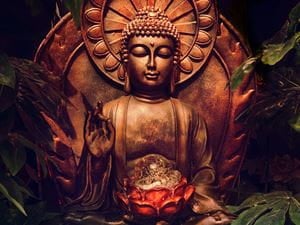
Understanding Buddhism: An Atheistic Religion
Buddhism is a non-theistic religion, and therefore worship is not a useful concept in the tradition. This means Buddhists do not believe in a specific god, goddess, or set of gods and goddesses who rule the cosmos. In Buddhism, nothing is eternal, so there can be no eternal deity. Similarly, one of the most basic ideas of Buddhism is that everything must come from something. This means that there is no place in Buddhism for any sort of true Creator that Western religions would recognize. There are gods to be found in Buddhism, but the gods of Buddhism are mortal, if long-lived, as well as imperfect.
The more appropriate term, instead of "worship," is to venerate. Buddhists revere many figures throughout history that have taught them how to live life and achieve enlightenment. The most famous of these figures is Gautama Buddha. Gautama Buddha, sometimes referred to as Shakyamuni Buddha, is the figure that most people in the West picture when someone describes the Buddha. Let's dive into the history of these venerated figures.
The Figure of Gautama Buddha
The Journey of Siddhartha Gautama to Enlightenment
Gautama Buddha, sometimes referred to as Shakyamuni Buddha, is the figure that most people in the West picture when someone describes the Buddha. Gautama Buddha was born Siddhartha Gautama in the 5th century B.C. He was born a prince, but eventually became disillusioned with the world and became an ascetic monk. This, however, did not give him the peace or clarity he was searching for. Siddhartha Gautama began to search for a new way to reach enlightenment. As he was sitting under a Bodhi tree meditating, Siddhartha Gautama achieved enlightenment and became a buddha, an "awakened one."
Gautama Buddha's Influence and Teachings
Gautama Buddha is considered to be the author of the sutras that almost all Buddhists look to for guidance. While Gautama Buddha is not worshipped as a god, he is a figure worthy of great reverence and devotion in Buddhism and seen as one of the greatest, if not the absolute greatest, moral teachers in history.
Other Buddhas and Bodhisattvas in Buddhism
Amitabha Buddha and Pure Land Buddhism
Like Gautama Buddha, Amitabha Buddha achieved the same form of liberation and enlightenment. Amitabha Buddha is the focus of a Buddhist tradition known as Pure Land Buddhism. A form of Mahayana Buddhism most commonly found in East Asia, Pure Land Buddhism holds that those who achieve enlightenment will be reborn into the Pure Land with Amitabha. Those who achieve rebirth in the Pure Land are not necessarily liberated from the cycle of rebirth, but it is much easier to work toward enlightenment and liberation while in the Pure Land.
The Anticipation of Maitreya Buddha
Finally, many Buddhists anticipate the Maitreya Buddha, the Buddha who is to come. This Buddha has achieved enlightenment and been reincarnated already many times, serving others as a bodhisattva. When he comes, he will be a universal teacher, bringing many to enlightenment.
Conclusion: Who Do Buddhists Worship?
In conclusion, Buddhists do not worship in the traditional sense of the word, as there is no belief in a specific god or set of gods ruling the universe. Instead, they venerate figures like Gautama Buddha and other enlightened beings who have guided them on the path to enlightenment. The practice of veneration in Buddhism is more about respect and reverence for the teachings and wisdom these figures have imparted, rather than worshiping them as divine entities. Understanding this distinction helps to appreciate the unique approach to spirituality and enlightenment found in Buddhism.
8/3/2023 7:10:52 PM









